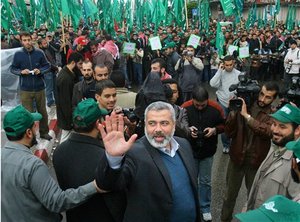IN THE MEDIA
Rather than compromising, Hamas is gaining confidence
March 21, 2012 | Colin Rubenstein

Colin Rubenstein
An edited version of this article appered in the Canberra Times – March 21, 2012
Over the past weekend, over two hundred rockets were fired into southern Israel from the Gaza Strip, injuring several people, sending up to a million Israelis to the bomb shelter, and canceling school for approximately 200,000 students. Israeli air strikes targeted the Popular Resistance Committee (PRC) and Palestinian Islamic Jihad – the groups responsible for the rocket attacks – killing 26 Palestinians of whom 22 were terrorists, many hit in the act of firing rockets.
The violence was triggered when Israel carried out a targeted killing of Zuhair al-Qaissi, the leader of the PRC, whom it said was planning a major attack on Israel through Sinai. This was the fourth major outbreak of conflict around Gaza over the past year.
Why does such violence constantly recur? Simply put, it is the bitter fruit of the Hamas takeover of the Gaza Strip in a coup against the Palestinian Authority (PA) in 2007. Hamas was not firing the rockets this time around, but there is no doubt that they allow and even encourage groups like PRC and Islamic Jihad to do so. More importantly, Hamas is very happy for the PRC to plan attacks on Israel from Sinai – which allows them plausible deniability – thus prompting Israeli counter-measures like the attack on al-Qaissi.
Hamas seems incapable of restraining such activity even though, logically, it would seem calm would allow them to consolidate their control over their Gaza fiefdom. Why? Because Hamas’s whole religious worldview and ideology rejects any long-term co-existence with Israel – Hamas leaders actually say that they are religiously prohibited from even considering this. And because their traditional paymasters in Teheran and Damascus demand confrontation with Israel as the price of their support.
While their worldview has not changed, there are signs that the latter calculation is now in flux. The unrest in Syria has caused Hamas to close their long-standing headquarters in Damascus, and distance themselves from the Syrian regime, as it murders and oppresses opposition groups, some of which are Sunni Islamist allies of Hamas.
There is a demonstrable split in Hamas, with its external leader Khaled Meshaal attempting to move the organisation away from its traditional alliance with, and dependence on funds and arms from, Iran. In early February, he signed an in-principle power-sharing agreement with Palestinian Authority (PA) President Mahmoud Abbas’s Fatah party in Doha, which would see Abbas also assume the role of prime minister in an interim government.
That deal looks to be going nowhere fast, as have all past such unity “agreements” – mostly because Fatah and Hamas deeply distrust one another, bear considerable bad blood from past conflicts and carry fundamentally different visions for the character of a future Palestinian state.
Moreover, Hamas’ various leaders have failed to unite behind the Doha deal as signed by Meshaal. Senior Hamas officials in the Gaza Strip including Hamas PM Ismail Haniyeh and Foreign Minister Mahmoud al-Zahar have criticised the agreement.
Only days after Meshaal inked his pact with Abbas in Doha, Haniyeh was in Teheran pressing the flesh with Mahmoud Ahmadinejad and supreme leader Ayatollah Ali Khamenei. During his visit, Haniyeh vowed that Hamas “will never recognise Israel… The resistance will continue until all the Palestinian land, including Al-Quds [Jerusalem], is liberated.”
Meanwhile, with or without Hamas, Iran was a definite player in the current round of unrest. One of the group firing rockets was Palestinian Islamic Jihad, which is a completely loyal, bought and paid for, Iranian proxy. Reports say Teheran was urging the group to make an all out effort to maximise rocket launches over the weekend. Similarly, the PRC also reportedly receives considerable Iranian support. Iran would have been keen to encourage Gaza violence to distract attention from their own nuclear weapons program, as well as the brutality in Syria, where the Assad regime remains a key Iranian ally.
Meanwhile, Hamas’ diaspora leadership is adrift after leaving Damascus and looking for a new home. In addition, Meshaal has recently said he would not run for re-election as political head, raising more questions over his authority as a lame duck leader.
Hamas is undergoing internal ructions because the Arab Spring has shaken up all traditional alignments and strategic assumptions in the Middle East. However, rather than embracing compromise, Hamas as a whole is gaining confidence due to the ascendancy of regional Islamist movements, including the Muslim Brotherhood in Egypt, Tunisia and potentially the new ruling party in Libya. Hamas views the changes brought on by the Arab Spring as empowering for itself while negatively effecting the strategic situation of the PA and Israel. Until recently most Arab countries had shunned Hamas, but now the emerging Islamist regimes are reaching out to them.
While the media has framed the current rift in Hamas as a disagreement between moderates and hard-liners, in actuality, the split may be more tactical than ideological. What is important to understand is that none of Hamas’s potential suitors – be they the Shias of Iran or the Muslim Brotherhood Sunnis of Egypt, Jordan, Qatar and elsewhere – are asking Hamas to abandon its rejectionist ways.
The result of these changes is of course uncertain, but they are very unlikely to alleviate as opposed to exacerbating the continuing instability around Gaza. Hamas’s Gaza leadership is counting on the Egyptian Muslim Brotherhood, Hamas’s parent organisation, taking over in Cairo and offering direct military, financial, and political support over the Gaza border for their conflict with Israel. Given that the Islamist-dominated Egyptian parliament on the weekend demanded a severing of all ties with Israel, they may well receive their wish. The result could make the recent mini-war over Gaza look like a trifling episode by comparison.
Dr Colin Rubenstein is Executive Director of the Australia/Israel & Jewish Affairs Council.
Tags:





